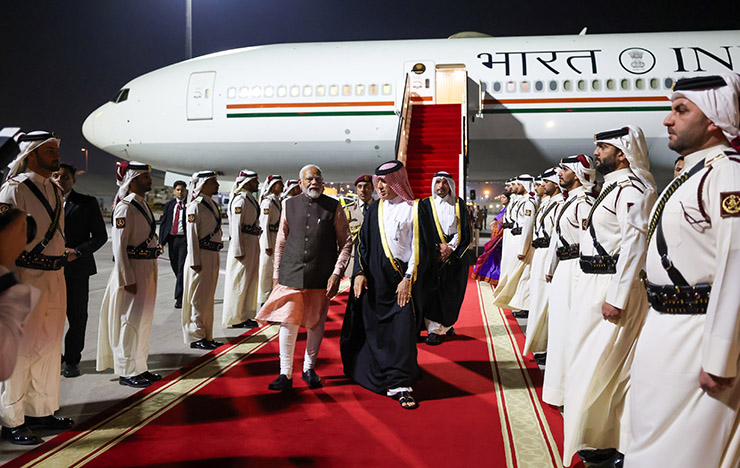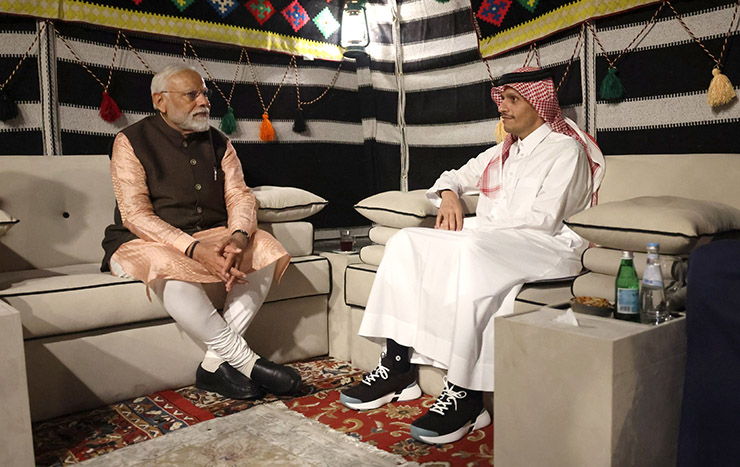
After his two-day whirlwind official trip to the UAE, Prime Minister Narendra Modi landed in Doha on February 14, which was in a way thanksgiving visit to Qatar for its magnanimity to release former Indian Navy personnel, nearly three-and-half months after a Qatari court handed them a death sentence, which was later commuted to jail terms ranging from three to 25 years. These eight ex-Indian Navy personnel were arrested in August 2022 on charges of passing sensitive submarine-related information to Israeli intelligence, but neither Qatar nor India officially confirmed the charges. However, at the time of arrest, they were working for Dahra Global, which has since been shut down.
Dahra Global was a part of Dahra, the Oman-based company that provides services in the security, defence, aerospace, information technology and communications sectors. The assigned task of these ex-Indian naval officials was to oversee the training of Qatar Naval personnel. Family members of former Indian Naval personnel denied reports that these men were ever involved in espionage and that for a third country, namely Israel. Western media, especially Financial Times and Reuters reported that these men were charged with spying for Israel.
After meeting Al-Thani in Dubai, Prime Minister Modi posted a message on X, saying, “We had a good conversation on the potential of bilateral partnership and the well-being of the Indian community in Qatar.” It showed that the Prime Minister would have raised the issue related to the release of ex-Indian Naval personnel with the Qatari Emir
But credit goes to India’s diplomacy and top leadership that it never budged in employing its strategy in pursuing the case in the Qatari court. It avoided rhetoric or public criticism of Doha. Rather, it showed respect to the Gulf country’s legal system and provided all accused ex-Indian Naval personnel with full legal support and counsel, and further took the case to the highest level with Prime Minister Modi discussing it with Qatari Emir, Sheikh Tamim bin Hamad Al-Thani, during a meeting in Dubai on the sidelines of COP28 in December.
After meeting Al-Thani in Dubai, Prime Minister Modi posted a message on X, saying, “We had a good conversation on the potential of bilateral partnership and the well-being of the Indian community in Qatar.” It showed that the Prime Minister would have raised the issue related to the release of ex-Indian Naval personnel with the Qatari Emir.
Soon after the release of all eight Indian men from the Qatari jail, Prime Minister Modi who was scheduled to leave for the UAE on a two-day visit for the World Government Summit and the inauguration of the BAPS Hindu Mandir in Abu Dhabi, added Qatar to his itinerary list and flew straight to Doha after completing his official engagements in the UAE on February 14. The development showed his earnest desire to visit Qatar to thank the Gulf nation’s Emir Hamad Al-Thani for showing mercy on Indian nationals who could not have been alive had there been no high-level involvement in their release.
Just days before the release of Indian men, Qatar Energy and Petronet LNG Limited had signed a $78 billion deal for the supply of 7.5 MMTPA LNG from Qatar to India for 20 years, starting in 2028. Some analysts claim that this deal worked as a key factor behind the release of ex-Naval officials
The case served as a timely reminder of the importance of diplomacy and avoidance of knee-jerk reaction to an issue that was extremely sensitive and as such, any public sparring could have impacted bilateral relations between the two countries. Only last year, India and Qatar celebrated 50 years of establishment of full diplomatic relations. Besides, Qatar is home to more than 8,00,000 Indians who bring in critical remittances for India. It is also an important energy partner of India. Just days before the release of Indian men, Qatar Energy and Petronet LNG Limited had signed a $78 billion deal for the supply of 7.5 MMTPA LNG from Qatar to India for 20 years, starting in 2028. Some analysts claim that this deal worked as a key factor behind the release of ex-Naval officials. However, a close analysis of development shows that multiple factors, including Prime Minister Modi’s involvement and his chemistry with Gulf leaders. Also, Hamad Al-Thani played a significant role in releasing Indian nationals from the Qatari jail.

Prime Minister Modi, who has invested time and energy in convincing Gulf leaders to de-hyphenate India from Pakistan, has visited the region 15 times since 2014. He had earlier visited Qatar in June 2016. External Affairs Minister S Jaishankar has also undertaken multiple visits to Qatar in the last four years, while Vice President Jagdeep Dhankhar landed in Doha in November 2022 to participate in the inauguration of the FIFA World Cup. Before that, Indian Vice President Venkaiah Naidu also paid a two-day visit to Qatar in June 2022. These high-level visits have changed the course of India’s relations with Qatar and the Gulf region.
What has been noticeable is that Qatar decided to release the ex-Indian Navy personnel even as they had been accused of espionage for Israel, the West Asian nation that has itchy relations with Doha. Of course, it would not have been possible without enormous diplomatic efforts, well-managed coordination, and exploitation of India’s global stature
This apart, there has been growth in India’s global standing. It is currently the 5th economic power in the world and is raring to become the third economic power in the next few years. International organisations such as the IMF, the World Bank and others have acknowledged India’s remarkable economic recovery, surpassing that of China and the US. When Covid hit the world, India was among a few select countries such as the US, Germany, the UK, and China to develop its vaccine and supply it to more than 100 countries, including a developed nation like Canada. It is also a major defence and space power of the world, leveraging the country to become a powerful international player.
Then it should not be forgotten that India is amongst the few countries that have been able to lift its nationals out from most dangerous trouble spots such as Afghanistan, Ukraine, Sudan, Yemen, and Syria. The world has accepted India’s independent stand, though grudgingly, on Ukraine and the Hamas-Israel war. All this carries weight when India moves to secure its citizens trapped in trouble spots or on political charges.
In the case of ex-Indian Navy personnel, what has been noticeable is that Qatar decided to release them even as they have been accused of espionage for Israel, the West Asian nation that has itchy relations with Doha. Of course, it would not have been possible without enormous diplomatic efforts, well-managed coordination, and exploitation of India’s global stature. With this, India has once again markedly displayed its determination and indomitable courage to protect its nationals across the world.
–The writer is a senior journalist with wide experience in covering international affairs. The views expressed are of the writer and do not necessarily reflect the views of Raksha Anirveda















